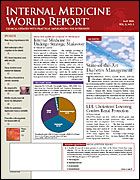Publication
Article
Internal Medicine World Report
Too Much, Too Little Sleep Increase Risk for Diabetes
Author(s):
A Novel Risk Factor for the Growing Epidemic
Diabetes Care
Investigators of a 15-year study, which found that too much or too little sleep per night could be an independent risk factor for diabetes, have concluded that 7 hours of sleep per night could be the optimal duration for reducing diabetes risk (. 2006;29:657-661).
Investigators recruited 1564 men who participated in the prospective, observational Massachusetts Male Aging Study that included 1709 middle-aged men (aged 40-70 years). None of the participants in this study had diabetes at baseline (1987-1989). Follow-up blood testing and health interviews were conducted in 1995-1997 and 2002-2004. Sleep duration was broken down into 5 categories: ≤5, 6, 7, 8, and >8 hours per night. Men who reported 7 hours of sleep per night served as the reference group. Multivariate analysis was performed using Poisson regression.
A total of 1139 men whose diabetes status could be determined during follow-up were included in the analytic sample. Of these, 181 were deceased, 200 declined to participate in follow-up, 43 were lost to contact, and 1 developed diabetes but his date of diagnosis was unknown.
A total of 90 new cases of diabetes were reported during the study period: 12 in men reporting ≤5 hours of sleep, 21 in men reporting 6 hours of sleep, 22 in men reporting 7 hours of sleep, 23 in men reporting 8 hours of sleep, and 12 in men reporting >8 hours of sleep per night.
Relative risk analysis showed that men reporting ≤5 or 6 hours of sleep per night were almost twice as likely to develop diabetes, and those reporting >8 hours of sleep per night were 3 times as likely to develop diabetes as men who reported 7 hours of sleep per night, after adjusting for potential confounders such as demographics, smoking status, alcohol use, diet, hypertension, heart disease, and cancer.
The investigators, led by H. Yaggi, MD, MPH, of Yale University School of Medicine, New Haven, Conn, noted that “this is the first large prospective cohort demonstrating a link between sleep duration and incident diabetes in men,” adding that “sleep duration may be a novel risk factor for the development of diabetes.”





